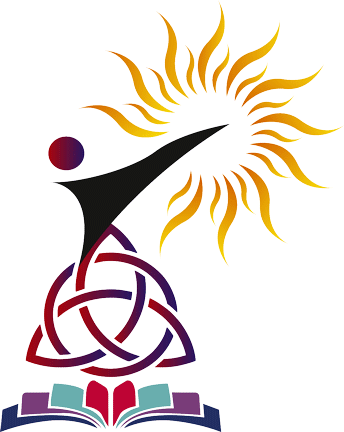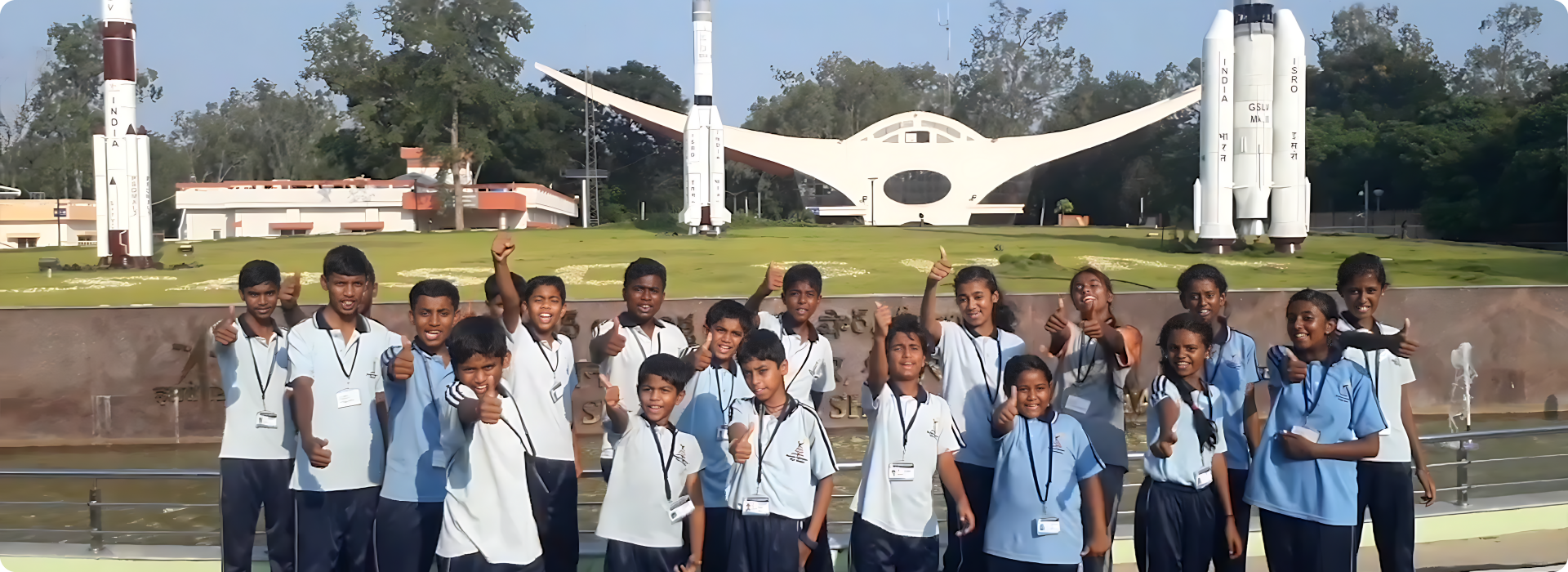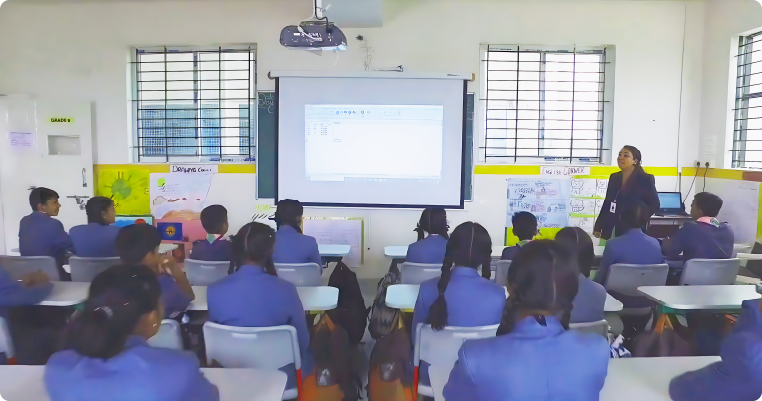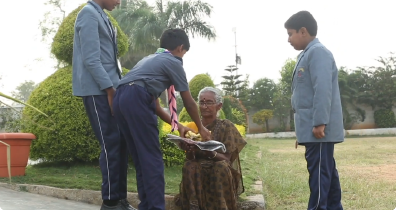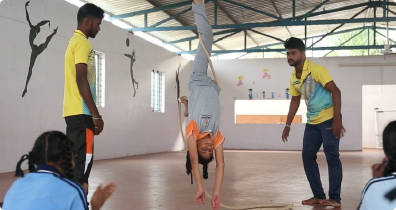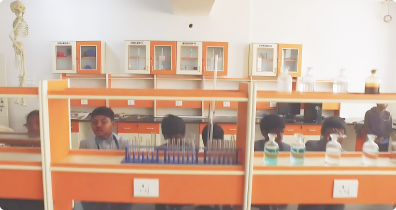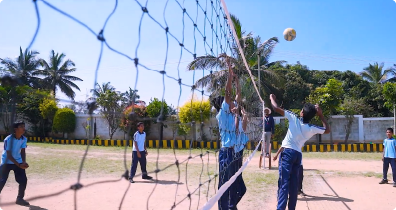Middle School
At Anjanadri skills are integrated into the curriculum across various subjects, allowing students to develop a comprehensive skill set that prepares them for higher education and beyond. Middle school education focuses on a balanced approach that combines academic knowledge with practical skills and personal development.
Education Programs
Key skills that are emphasized in middle schools under the Central Board of Secondary Education typically include:
Key skills
-
Language and Communication Skills:
Enhancing proficiency in the use of language, both written and oral, fostering effective communication, comprehension, vocabulary development, and grammar skills. -
Critical Thinking and Problem-Solving Skills:
Promoting analytical thinking, logical reasoning, and problem-solving abilities through various subjects, encouraging students to analyze information, evaluate evidence, and find creative solutions. -
Mathematical Skills
Building on the foundation laid in primary school, focusing on more advanced concepts such as algebra, geometry, statistics, and data interpretation, developing mathematical reasoning and problem-solving skills. -
Information and Communication Technology (ICT)
Skills:
Expanding computer literacy skills, including proficient use of productivity tools, internet research, data analysis, coding basics, and responsible online behavior. -
Scientific and Inquiry Skills:
Encouraging scientific inquiry, experimentation, observation, and data interpretation, fostering a scientific mindset, and promoting curiosity and exploration. -
Social and Emotional Skills:
Supporting the development of empathy, self-awareness, interpersonal skills, and conflict resolution abilities, promoting emotional well-being and positive relationships with peers and teachers. -
Collaboration and Teamwork:
Cultivating skills for effective collaboration, teamwork, and leadership, emphasizing the importance of working together, sharing ideas, and respecting diverse perspectives. -
Creative and Expressive Skills:
Nurturing creativity, imagination, artistic expression, and cultural appreciation through activities such as art, music, drama, and creative writing. -
Research and Information Literacy:
Introducing basic research skills, including identifying credible sources, conducting research, organizing information, and presenting findings effectively. -
Physical Education and Health Awareness:
Promoting physical fitness, sportsmanship, and a healthy lifestyle, emphasizing the importance of regular exercise, nutrition, and personal well-being.
Grade 6 to 8
Grade 6 Methodology & Curriculum
Anjanadri follows experiential learning & integrated learning where students engage in hands-on activities, projects, and real-life experiences to deepen their understanding of concepts. This approach encourages students to connect their learning with practical applications, fostering analytical and practical skills. Integrated learning, where different subjects are interconnected to provide a comprehensive understanding. This interdisciplinary approach helps students see the connections between subjects and promotes a holistic understanding of concepts.
-
Languages:
English, Kannada, and third language. The focus is on enhancing language skills, including reading comprehension, vocabulary, grammar, writing, and speaking skills. Students also work on developing effective communication and presentation skills. -
Mathematics:
Topics such as numbers, operations, fractions, decimals, geometry, algebraic expressions, ratio and proportion, data handling, and basic concepts of statistics. The curriculum emphasizes problem-solving, logical thinking, and mathematical reasoning skills. -
Science:
Explores a wide range of scientific concepts and skills. It covers topics such as matter, cells, tissues, motion, energy, diversity in living organisms, light, sound, electricity, and basic scientific experiments. The curriculum encourages scientific inquiry, experimentation, and critical thinking skills. -
Social Science:
Focuses on broadening students' understanding of society, history, geography, and civics. It covers topics such as ancient civilizations, maps and globes, resources and their conservation, democratic institutions, government, economic concepts, and disaster management. The curriculum aims to develop an awareness of the world, critical thinking, and social studies skills. -
Computer Science:
They learn about topics such as computer systems, algorithms, programming concepts, computer networks, and internet safety. The curriculum emphasizes computational thinking, problem-solving, and digital literacy. -
Art, Music, and Physical Education:
Students have opportunities to explore their creativity through art, engage in music activities, and participate in physical education classes to promote physical fitness, coordination, teamwork, and self-expression.
Grade 7 Methodology & Curriculum
Anjanadri follows experiential learning & integrated learning where students engage in hands-on activities, projects, and real-life experiences to deepen their understanding of concepts. This approach encourages students to connect their learning with practical applications, fostering analytical and practical skills. Integrated learning, where different subjects are interconnected to provide a comprehensive understanding. This interdisciplinary approach helps students see the connections between subjects and promotes a holistic understanding of concepts.
-
Languages:
The focus is on enhancing language skills, including reading comprehension, vocabulary, grammar, writing, and speaking skills. Students also work on developing effective communication and presentation skills. -
Mathematics:
opics such as rational numbers, algebraic expressions, equations, geometry, practical geometry, data handling, and basic concepts of statistics and probability. The curriculum emphasizes problem-solving, logical thinking, and mathematical reasoning skills. -
Science:
Explores a wide range of scientific concepts and skills. It covers topics such as nutrition in plants and animals, heat, motion, reproduction in plants and animals, acids, bases, and salts, weather, climate, natural resources, and basic scientific experiments. The curriculum encourages scientific inquiry, experimentation, and critical thinking skills. -
Social Science:
Focuses on broadening students' understanding of society, history, geography, and civics. It covers topics such as the medieval period, resources and development, environment, social and political life, and disaster management. The curriculum aims to develop an awareness of the world, critical thinking, and social studies skills. -
Computer Science:
Topics such as computer systems and organization, programming concepts, data handling, computer networks, and internet safety. The curriculum emphasizes computational thinking, problem-solving, and digital literacy. -
Art, Music, and Physical Education:
Students have opportunities to explore their creativity through art, engage in music activities, and participate in physical education classes to promote physical fitness, coordination, teamwork, and self-expression.
Grade 8 Methodology & Curriculum
Anjanadri follows experiential learning & integrated learning where students engage in hands-on activities, projects, and real-life experiences to deepen their understanding of concepts. This approach encourages students to connect their learning with practical applications, fostering analytical and practical skills. Integrated learning, where different subjects are interconnected to provide a comprehensive understanding. This interdisciplinary approach helps students see the connections between subjects and promotes a holistic understanding of concepts.
-
Languages:
English, Kannada, and third language. The focus is on enhancing language skills, including reading comprehension, vocabulary, grammar, writing, and speaking skills. Students also work on developing effective communication and presentation skills. -
Mathematics:
Topics such as rational numbers, algebraic expressions and equations, exponents and powers, factorization, quadrilaterals, mensuration, data handling, and basic concepts of statistics and probability. The curriculum emphasizes problem-solving, logical thinking, and mathematical reasoning skills. -
Science:
Explores a wide range of scientific concepts and skills. It covers topics such as crop production and management, microorganisms, synthetic fibers and plastics, metals and non-metals, force and pressure, light, sound, and basic scientific experiments. The curriculum encourages scientific inquiry, experimentation, and critical thinking skills. -
Social Science:
Focuses on broadening students' understanding of society, history, geography, and civics. It covers topics such as the Indian Constitution, resources and development, civil rights, industries, colonialism, nationalism, and disaster management. The curriculum aims to develop an awareness of the world, critical thinking, and social studies skills. -
Computer Science:
Topics such as computer systems and organization, programming concepts, data handling using Python, networking concepts, and internet safety. The curriculum emphasizes computational thinking, problem-solving, and digital literacy. -
Art, Music, and Physical Education:
Students have opportunities to explore their creativity through art, engage in music activities, and participate in physical education classes to promote physical fitness, coordination, teamwork, and self-expression.
